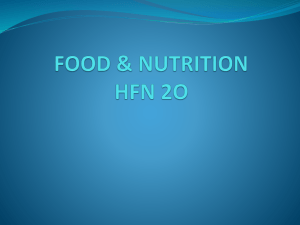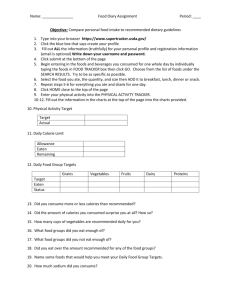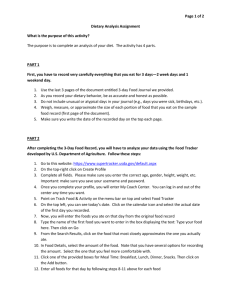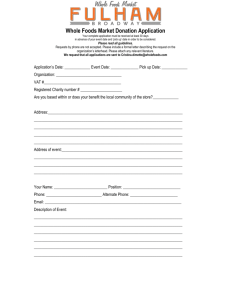Food Today
advertisement
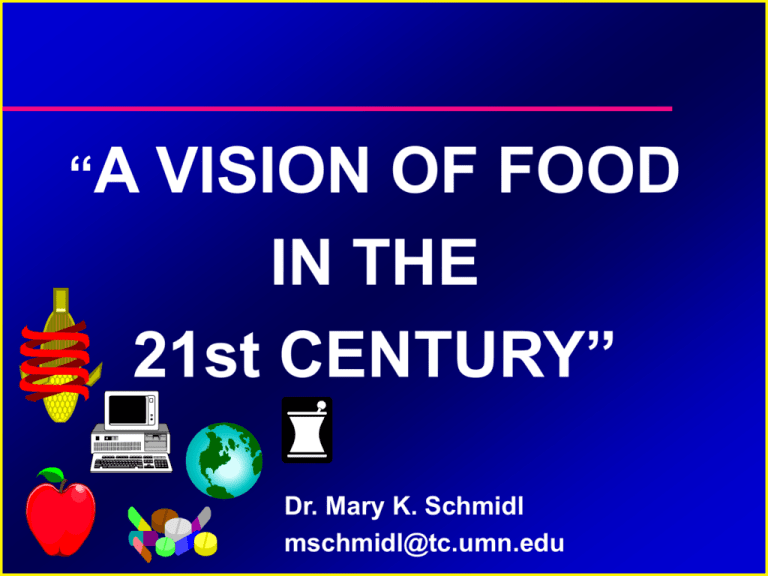
“A VISION OF FOOD IN THE 21st CENTURY” Dr. Mary K. Schmidl mschmidl@tc.umn.edu We Resist Change A detour is disturbing. We fear getting lost. Fear being in the wrong lane. It takes extra energy. DETOUR When Times Are Good, Change Can Be Avoided. “Don’t change a winning “Don’t fix what ain’t broke.” game.” “I’ll quite smoking tomorrow.” But I believe, when times are good, change will be easiest. The Food Sector Not a growth environment. It is a changing area……And therefore so must we. What we teach and know today is useless in a decade… if we are lucky! (often this happens sooner) Learning Must Be Continuous Who, a decade ago, would have forecast the “now requirement” of the WWW? Who dares predict the tools we will use in the food industry in another decade? Will you be skilled in using them? Learning must be continuous. Competition Is Now Global Software from Bangalore…. Run on computer chips made in Taiwan…. Guided by Malaysian cellular phones…which Manage microsecond transactions on stock exchanges that never sleep. Whatever one’s business is-Journalism: Competing for supremacy with the first and best story. Food Industry: Embellishing foods with “claims” to differentiate and enhance their value. Competition is intense. COMPETITION How many organizations do you know that have thrived for many decades, who are now closing their doors or appearing after the hyphen? Why? Their history blinded their vision, Century old habits embalmed their efforts and They looked backwards for hope while stumbling into their graves. Everyone Needs A Continuous Vision For Change Change is no longer an option. Vision and innovation must be created so that the food sector and the consumers both emerge as a constant winners. Winner Four Steps To Innovation A Vision People who champion The right research The right climate Creating the Vision: Understanding The Consumer Quality --Food safety through “eating” --Excellent flavor, same --Fresh, homemade --Technology balance (green, GMOfree, organic, etc.) Wellness and Health Benefits --Nutraceuticals, functional foods Reasonable Price--Cost Benefit Ratio Convenience --The “15 minute meal” Expected Time to Prepare A Meal 2.5 hours Minutes 200 150 150 100 60 30 50 15 0 1930 1950 1970 1990 People are too tired to cook or do not feel like cooking. FMI, 1996 Grab & Go Packaging “Portable Foods” “Creating Time” short and long term Execute highest priorities --Pursuit of happiness --Family --Work Living better--longer “Bing Time” What Does The Consumer Want? Experiences e.g.“Rain Forest Café” •Sound/Mist • Cool Sensations •Smell-Tropical • Visual-gorillas, birds, fish “Transformation” “Aspirations” Become a better driver--radar system car Become smarter, healthier Know what consumers want, What they want to be and How far away they are from their goal. Factors Driving The Trends The Economy (unemployment at all time low) Rapid An advances in technology aging population and rising health care cost Search for alternative or complementary medicine (anti-establishment) Shifting The Research Global Interaction w/ Universities but different Intellectual Mergers Property or “Brands” and Acquisitions “Build It Or Buy It” Mergers and Acquisitions General Mills----Pillsbury Kraft----Nabisco Kellogg----Keebler Unilever----Best Foods Pepsi--Quaker Oats The New Meal Vision Appetizer Oysters on the half-shell Processed using high pressure (45,000 psi) for 60 seconds Not only safe but easier to shuck The New Meal Vision Entree Peppered sirloin steak (“rare”) with immune enhancing herbs Standardized Echinacea Irradiation technology (E. coli 0157:H7) “Post Package Processing” In the 1950s and 1960s climate not right? Maybe The US Consumer Is Ready…. Ground Beef (E. coli) Cured Meats (Listeria) Fresh Poultry (Campylobacter) Treated By Irradiation Electron Beam Technology (Cook to 160°F) ? Hamburger Irradiation Hueskins Schwann’s Dairy Queen Several supermarket chains New Technology ? The New Meal Vision Homemade Dessert Chocolate Hi Chip Cookies Technology Eggs “Kid-Tasting Safe” A Paradigm Shift: Low Temperature Long Time (LTLT) processing: 100 minutes @ 58°C. (7D: 5 log cycle kill) “Kid-Tasting Safe” Tamper Evident Seal FDA has approved irradiation for eggs in shell. The New Meal Vision Dietary Supplement Vitamin E (750 IU) Protection Inhibit from heart disease oxidation of unsaturated fats found in meal Top Technologies Material Science Biotechnology Information Food-Drug Management Interface Top Technologies Material Science --Ingredient-Ingredient Interaction (amorphous Vs crystallize structure, proteins and reducing sugars) --Ingredient-Packaging Interaction (oxygen scavengers, “smart” films with antimicrobial surfaces or antioxidants, etc.) 90 vs 7 days shelf life Absorbs Oxygen and Creates Anaerobic Conditions Time Temperature Integrators (TTI) If the center bar is lighter than circle, product has been stored at the proper temperature. Italy: Proposed legislation “will require TTIs on fresh and frozen food with a short shelf life.” Temperature Control Inc Top Technologies Material Science --Ingredient-Ingredient Interaction (amorphous Vs crystallize structure) --Ingredient-Packaging Interaction (oxygen scavengers, “smart” films with antimicrobial surfaces or antioxidants) --Alternatives To Heat-- invisible technology (Gamma radiation, microwave, pulsed electric field, pulsed light at high intensity Cool Pure Light Pasteurized Shrimp 20,000 times intensity of sunlight Technologies such as this will give new meaning to the term “fresh”. Top Technologies Biotechnology -- Chymosin used in cheese making --Drugs insulin, nutraceuticals, etc. --Biotech-Chem-Agri Business GMO/GMO-Free; World Wide negative reaction Second Top Technology Is Under Attack Is The Climate Right ? Positive : Design of Allergen Free Food Low Cost, Nutritious, Edible Vaccines Spoons Replace Needles Scientists insert a gene that enables the tuber to make a nontoxic protein subunit of the cholera toxin. This protein binds to mucosa cells and triggers formation of antibodies against cholera. Bananas and tomatoes being considered Top Technology 1958 ENIAC 18,000 lb 300 Meg memory @ 650 Hz Top Technologies Information Management --Just-In-Time Computer Controls Computer controlled processing --Computer Modeling Ingredient substitution; predictions if pathogens will grow --The Internet Information for consumer; E-commerce --Home Offices Why drive to work? --Analytical Information Finding out what we do not know 9/24/02 Food Levels Tornquist et al J Ag Food Chem Aug 14, 2002 Potato chips 85- 3897 µg/Kg Breakfast cereals 30-2300 µg/Kg French fries 780 µg/Kg Coffee 200-310 µg/Kg Mashed potatoes 200 µg/Kg Bread 13-150 µg/Kg Meat balls 30-60 µg/Kg Fried hamburger 14-23 µg/Kg EU Report http://europa.eu.int/comm/food/fs/sc/scf/out131_en.pdf EU Recommendations Industry should strive to achieve low levels Large ranges in each food suggest can lower Foods should not be cooked excessively Eat a balanced and variable diet Establish an acrylamide information network Further research –Mechanism of formation –Measures to reduce levels –Bioavailability from food –Epidemiology of exposure Food Bio-Security Disgruntled Employees Top Technologies Material Science Biotechnology Information Food-Drug Management Interface Focus on Today Chronic disease result of years of “wear and tear” on the body A Tough target for prevention & cure (using surgery, drugs or food) May include a food that “simulates” a conventional food. Brocco Sprouts Johns Hopkins School of Medicine Sulforaphane GS (Glucosinolate) A natural anticarcinogenic compound (inducer of detoxification enzymes) 1 oz. equals 1.25 pounds of cooked broccoli (20 times concentration)! Claims are required by law to be truthful and not misleading. -FDA (label & labeling) -FTC (advertising, unfair and deceptive) US Claims Allowed On Foods Structure-Function (DSHEA) Notification Process (4000+ submitted) Disclaimer Required Statement US Claims Allowed On Foods Structure Function (Foods) No Notification To FDA/No Disclaimer Bureau of Alcohol Tobacco and Firearms (February 5, 1999) Two approved statements for wine labels “The proud people who made this wine encourage you to consult your family doctor about the health effects of wine consumption.” Causes? 3800 cal/day available eating 3700 vs 3100 in 1960 More eating out 34% vs 19% in 1978 More snacking 17.7% of diet vs 11.3% in 1980 Advertising and TV Eat 230 lbs meat, poultry & fish vs 165 lbs in 1920 Causes? Supersizing fast food –1957 fast food hamburger 1 oz 210 calories –2002 6oz 618 calories –Mac Extra value SuperSize = 1550 calories –Same things in extra value meal $3.74 vs $5.03 –Yet fat in diet 34% vs 40% in 1990 N.Y. MAN SUES, BLAMING FAST FOOD FOR ILL-HEALTH July 26/02 Reuters By Gunna Dickson NEW YORK - A 5-foot-10-inch, 272-pound (177.8 cm, 123 kg) man has, according to his attorney, sued four major fast food chains, claiming they contributed to his obesity, heart disease and diabetes. The story says that the class-action lawsuit, which was filed in the Bronx Supreme Court on July 24, is seeking undetermined compensatory damages against McDonald's, Wendy's, KFC Corporation, owned by Yum Brands Inc., and Burger King, on behalf of 56-yearold maintenance worker Caesar Barber and others. The story says that the lawsuit, which estimates that millions of Americans could be included in the claim, also seeks to have the companies label individual products with fat, salt, cholesterol and other dietary content as well as to warn users of the health effects. New York attorney Samuel Hirsch, who is representing Barber, was cited as saying consumers were not getting adequate warning about foods that could cause obesity, diabetes, heart disease, high blood pressure and elevated cholesterol levels, adding, "Fast food chains failed to disclose the contents in terms of calories, fat grams and sodium. Even when posted, the information is not easily understandable to the public." Steven Anderson, president and CEO of the Washington-based National Restaurant Association was cited as saying the lawsuit "gives frivolous a bad name. This lawsuit, which solely makes restaurants responsible for obesity in America, swallows a simplistic notion. It is a blatant attempt to Obesity Bill WASHINGTON - U.S. Senators Bill Frist (R-TN), Jeff Bingaman (D-NM) and Christopher Dodd (DCT)on 7/30/02 introduced comprehensive legislation aimed at reducing obesity, particularly among children and adolescents. The "Improved Nutrition and Physical Activity Act", or "IMPACT," recognizes significant problems associated with obesity including heart disease, diabetes and cancer and works to reduce those problems by encouraging better nutrition and more physical activity. USDA USDA Certified Organic Rules 7 CFR 205 (136 pages in Federal Register) Excludes GMO (<5%) and irradiated foods Excludes use of sewage sludge Excludes fish and seafood, honey, culinary herbs, mushrooms, pet food Organic and GMO New Standard Allows 5% GMO NATURAL/ORGANIC FOODS BUT “PERCEIVED” HEALTHY 1998 Sales were $3.3 Billion US; also growth in Europe/Japan Growth in “Organic” food sales 20%/year Growth in mass market foods 3-5%/year By 2008 expected to have 10% of grocery store market. Nessa Richman, the Wallace Institute, 1999 Top Retail Food Store Companies, U.S. 1930 1990 1999 1. A&P 1. Kroger 1. Kroger 2. American 2. American Stores 2. Wal-Mart 3. Kroger 3. Safeway 3. Albertson’s 4. Safeway 4. Winn- Dixie 4. Safeway 5. National Tea Percent of Total Sales: 17 16 34 Source: Mayo, Food Institute Report Wal-Mart is all Supercenter sales Supermarket Changes Electronic shelf tags ($/temperature) Electronic fund transfer Credit card/Loyalty shopper programs “Up Graded UPC Bar Codes” Tracer Tags Future Smart refrigerator –Segregated atmospheres –Knowledge base of contents –Automatic ordering E-commerce with smell Product knowledge tags –Shelf life –Electronic cooking information FUTURE A Happier Ending
